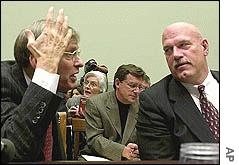NEW YORK (CNN/Money) - Baseball Commissioner Bud Selig, under attack for a plan to close two teams, argued Thursday that the solution being proposed in Congress would instead lead to multiple teams moving from smaller to larger markets.
Selig, testifying before the House Judiciary Committee, argued that the sport's exemption from the nation's antitrust laws, unique among professional sports leagues, allowed baseball to block teams moving from city to city as has occurred in other sports, such as football.
"If we didn't have the right to keep teams where they are, teams would have moved," said Selig. "This exemption has promoted stability. It's done the very thing that people talk about wanting to avoid."
But the legislation, authored by Rep. John Conyers, D-Mich., would make closing the two teams more difficult because it would open the door to antitrust lawsuits by cities or states seeking new teams or hit with a team closing, who could argue the move was an unfair limit on competition.
The legislation won the support of Minnesota Gov. Jesse Ventura, home to the Minnesota Twins, one of the teams threatened with contraction, and Steve Fehr, who spoke on behalf of the Major League Baseball Players' Association.
"If baseball is your business, you can meet in Chicago, conspire to control output to maximize profits and it's perfectly legal," said Ventura, who compared Major League Baseball to OPEC. "That's not fair and you should do something about it."

|
|
|
Baseball Commissioner Bud Selig, left, testifying on the sport's exemption from antitrust laws at a House Judiciary Committee hearing Thursday, as Minnesota Gov. Jesse Ventura, right, looks on. | |
Selig argued that contraction was made necessary by the mounting losses in baseball, which he argued left only 5 teams -- the Seattle Mariners, the Milwaukee Brewers, the New York Yankees, the Chicago Cubs and the Kansas City Royals -- making money during the just-completed 2000 season. The league as a whole lost $344.7 million from operations during the just-completed season, according to data Selig presented. Including amortization from past purchases, baseball lost $519 million during the season, he said.
But his data were challenged by Fehr, a players' agent and brother of the union's president, who said that data presented to the union raised questions whether the situation is as dire as Selig made it out to be.
"The problem is often not the numbers on the page, but often the numbers not on the page," Fehr said, adding that the union is prevented by a confidentiality agreement and threat of lawsuit from releasing the data it has available.
Selig contended that the suggestion that baseball is not giving an accurate accounting of its finances as "nonsense." But he had trouble answering questions as to how contraction would improve the finances of the league overall other than a slight increase in revenue sharing to the remaining clubs.
In fact, his statistics show that the Twins lost only $3.8 million last year, less than losses of such big-market teams as the Los Angeles Dodgers, the Chicago White Sox or Boston Red Sox. Selig confirmed the Red Sox are seeing bids of between $300 million and $400 million for about 53 percent of the club now up for sale. The Dodgers, bought by Fox Entertainment Group Inc. (FOX: Research, Estimates) for $375 million in 1999, was the biggest money loser at $68.9 million last season, according to Selig's statistics.
Despite the tough questioning about contraction and the extent of baseball's financial difficulties, Selig did find bipartisan support on the committee for retaining the antitrust exemption.
"It's a tempting response to the problems baseball has right now. It feeds into anger and frustration that fans have about the potential of losing their teams," said Rep. Marty Meehan, D-Mass. "But I don't believe that taking away the antitrust exemption will solve this problem and it could make it worse. I don't see how triggering a antitrust litigation free-for-all...really solves anything." 
|

